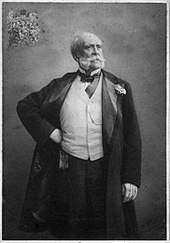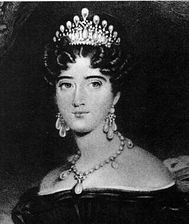Friedrich Wilhelm II. (Mecklenburg)
(II.) Frederick William, Grand Duke of Mecklenburg [-Strelitz] (* 17th October 1819 in Neustrelitz , † the 30th May 1904 ibid; Complete name: Friedrich Wilhelm Karl Georg Ernst Adolf Gustav ) was from 1860 to 1904 Grand Duke of Mecklenburg in part of the country Mecklenburg-Strelitz .
Life
origin
Friedrich Wilhelm (II.) Was the eldest son of Grand Duke Georg (1779–1860) and his wife, b. Princess Marie (1796–1880), daughter of Elector Friedrich III. von Hessen-Kassel and Karoline Polyxena von Nassau-Usingen . His paternal grandparents were Duke Karl (Ludwig Friedrich) (Hereditary Prince, later Regent of Mecklenburg-Strelitz as Grand Duke Karl II ) and Princess Friederike of Hesse-Darmstadt .
Youth and family
Friedrich Wilhelm spent his youth in Neustrelitz and studied history and law in Bonn from 1837 to 1839 . After completing his studies, he went on a cavalier tour to Italy and Switzerland . During a visit to relatives in England in October 1842 , he met his cousin (second degree) Princess Augusta Karoline of Cambridge , Princess of Great Britain, Ireland and Hanover, the older daughter of Adolphus Frederick, 1st Duke of Cambridge and Viceroy of Hanover and his wife Auguste from Hessen . On June 28, 1843, Hereditary Prince Friedrich Wilhelm married Princess Augusta Karoline (1822–1916), granddaughter of King George III, in the chapel of Buckingham Palace in London . She belonged to the British royal family . The marriage produced three sons:
- Son, stillborn (* / † 1843)
- Friedrich Wilhelm (* / † January 13, 1845)
- Adolf Friedrich (V.) (1848–1914) ⚭ 1877 Princess Elisabeth of Anhalt-Dessau (1857–1933).
Government affairs
With the death of his father on September 6, 1860, Friedrich Wilhelm, who had meanwhile gone blind, took over the affairs of government in Mecklenburg-Strelitz (due to an old mistake in the Mecklenburg regent counting, his name always appears in literature without a dynastic count, while he is actually Friedrich Wilhelm II ). His reign was marked by austerity bordering on austerity in all public spending. Necessary investments in the economy , infrastructure and education were largely omitted. In addition, modern developments stagnated or were slow to take hold. This policy was able to achieve that mountains of debt accumulated over generations of the Princely House could be removed. However, the country developed into one of the most backward German territories, to which Chancellor Otto von Bismarck wanted to flee in the event of the end of the world, because in his opinion the world would end here fifty years later.
Friedrich Wilhelm was the largest landowner in his dominion and remained involved in the frozen system of a feudal rural constitution of the Mecklenburg state, in which the two sovereigns had only limited room for maneuver. During his reign, both parts of Mecklenburg became members of the German Confederation and from 1871 members of the German Empire . At the imperial proclamation in Versailles on January 18, 1871, he was represented by his son Adolf Friedrich . Friedrich Wilhelm's anti-Prussian attitude led to considerable political tensions and differences with the young empire. For a time, his deposition as Strelitz regent was considered at the imperial level.
Through inadequate thrift and financial speculation, the so-called “blind household treasure” grew during his reign , starved by the country and its subjects. On the occasion of the Prince's Diamond Wedding (60 years old) in 1903, every citizen of the Grand Duchy was paid 25 Pfennig from the public purse. Friedrich Wilhelm left a fortune to his son and successor, which made him one of the richest German princes.
Awards
- On August 12, 1862, he was awarded the Order of the Garter by his cousin (second degree), Queen Victoria of Great Britain and Ireland .
gallery
See also
literature
- The marriage of the Hereditary Grand Duke of Mecklenburg-Strelitz and Princess Auguste of Cambridge . In: Illustrirte Zeitung . No. 11 . J. J. Weber, Leipzig September 9, 1843, p. 163-166 . ( books.google.de ).
- The ceremony at the wedding of the Hereditary Grand Duke of Mecklenburg-Strelitz and the court festivals in England . In: Illustrirte Zeitung . No. 11 . J. J. Weber, Leipzig September 9, 1843, p. 171-174 . ( books.google.de ).
- Gustav von Glasenapp : Military Biographies of the Officer Corps of the Prussian Army. G. Bernstein, Berlin 1868, p. 34. ( digitized version ).
- Wilhelm Bartold: Friedrich Wilhelm Grand Duke of Mecklenburg-Strelitz and Augusta Caroline of Great Britain, Ireland and Hanover, Grand Duchess of Mecklenburg-Strelitz. A picture of life based on acts, records and memories. G. Barnewitz, Neustrelitz 1893.
- Adolf von Deitenhofen: Foreign princes in the Habsburg army 1848–1898. Self-published, Vienna 1898. pp. 446–450. ( Digitized version )
- Regulations on the transfer of the high body of ... Grand Duke ... Friedrich Wilhelm ... to the Grand Ducal Hereditary Burial at Mirow on June 8, 1904. Bohl, Neustrelitz 1904.
- Karl Horn: Speech at the memorial stone for the former SKH d. Grand Duke Friedrich Wilhelm of Mecklenburg-Strelitz. Held in Mirow on Oct. 17, 1905. Wagner, Neustrelitz 1905.
- Helmut Borth: Duchy of Mecklenburg-Strelitz: of crowned heads, blue-blooded cuckoo children and the Mirow princely crypt. Steffen Verlag, Friedland 2015, ISBN 978-3-942477-06-2 . Pp. 153-160.
- Sandra Lembke: Majesties, Generals and Heartbreakers. Guests at the Mecklenburg-Strelitzer Hof. Steffen Verlag, Berlin 2014, ISBN 978-3-942477-97-0 . P. 9 f.
- René Wiese: Pre-March and Revolution. The diaries of Grand Duke Friedrich Franz II of Mecklenburg-Schwerin 1841–1854. (= Sources and studies from the state archives of Mecklenburg-Western Pomerania; Volume 16). Böhlau, Cologne 2014. ISBN 978-3-412-22271-0 .
Web links
- Literature by and about Friedrich Wilhelm II. In the catalog of the German National Library
- Literature about Grand Duke Friedrich Wilhelm (II.) In the state bibliography MV
- The Grand Ducal House of Mecklenburg-Strelitz: Friedrich Wilhelm II.
Individual evidence
- ^ Duke Friedrich Wilhelm (II.) Appears in the dynastic count of the regents of Mecklenburg almost without counting. This is fundamentally wrong, as there was another regent of the same name in Mecklenburg, Friedrich Wilhelm (I) , before him . In both cases, the widespread error in Wikipedia has been fixed, the count in parentheses has been added and taken into account in the lemma.
- ^ An English princess from Hanover. In: Helmut Borth: Herzoghaus Mecklenburg-Strelitz: of crowned heads, blue-blooded cuckoo children and the Mirow princely crypt. Steffen Verlag, Friedland 2015, ISBN 978-3-942477-06-2 , p. 160 ff.
- ^ The Mirow dead list of the House of Mecklenburg-Strelitz. In: Helmut Borth: Herzoghaus Mecklenburg-Strelitz: of crowned heads, blue-blooded cuckoo children and the Mirow princely crypt. Steffen Verlag, Friedland 2015, pp. 14–19.
- ↑ Buried on May 31, 1845 in III. Department of the Princely Crypt in Mirow . see. Hans Witte (Ed.): Mirow, Festschrift 1227–1927. Verlag des Heimatverein, Mirow 1927, p. 25.
| predecessor | Office | successor |
|---|---|---|
| George |
Grand Duke of Mecklenburg [-Strelitz] 1860–1904 |
Adolf Friedrich V. |
| personal data | |
|---|---|
| SURNAME | Friedrich Wilhelm II. |
| ALTERNATIVE NAMES | Friedrich Wilhelm Karl Georg Ernst Adolf Gustav (full name) |
| BRIEF DESCRIPTION | Grand Duke of Mecklenburg [-Strelitz] |
| DATE OF BIRTH | October 17, 1819 |
| PLACE OF BIRTH | Neustrelitz |
| DATE OF DEATH | May 30, 1904 |
| Place of death | Neustrelitz |









